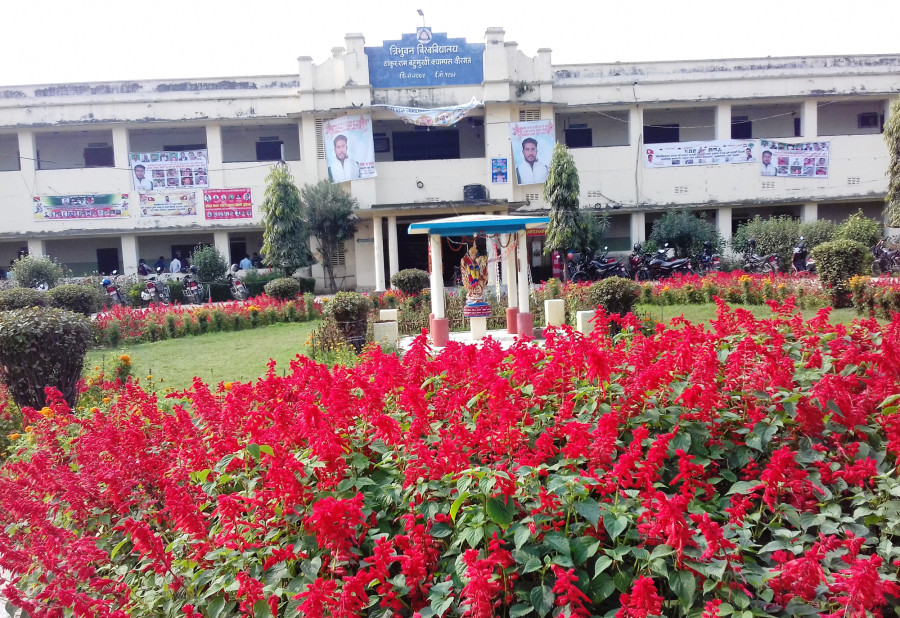Editorial
Decline and fall: Thakur Ram Campus and the state of colleges in Nepal
Stakeholders must all collaborate to turn around Thakur Ram Multiple Campus.
Nepal’s higher education system is flawed. Plagued by years of political interference, most of the universities in Nepal have taken great hits to their reputation recently. Controversies ranging from cronyism and nepotism in the hiring of professors to plagiarism have rocked previously esteemed institutions like Tribhuvan University. The issues have gotten so bad that even Kathmandu University, once afforded much more credibility than any other Nepali university, has had its reputation tarnished.
In such a circumstance, it isn’t surprising, though highly unfortunate, that the colleges affiliated to these universities too have been facing degradation. It is particularly worrying when the country’s oldest campuses start to lose lustre. And that is exactly what is happening at Thakur Ram Multiple Campus in Birgunj. Reports that the classes at the campus face regular disruptions and that the facilities are unusable and uninhabitable do not bode well for the future of the college.
At a time when the college’s history should have afforded it a higher budget, the fact that the teachers don’t even get paid well shows the lack of vision at the affiliate university. For the people of Birgunj and Province 2, this loss of a great campus will have a lasting negative impact. The concerned authorities at Tribhuvan University and at Thakur Ram must make amends. Not only should the college’s budget be increased, so that a strong teaching faculty can be exclusively retained, but a plan must be put forth to revamp infrastructure so that the enrolled students can experience an enriched college experience. It is, after all, at such colleges that the future of Nepal build their foundations.
The fact that universities and colleges play a critical role in structuring societies cannot be overstated. But the concerned authorities have repeatedly failed to understand this. Thakur Ram, in particular, has definitely fulfilled such a role. As it turns out, the campus has been home to former prime minister Madhav Kumar Nepal, former commissioner of the Commission for the Investigation of Abuse of Authority Surya Nath Upadhyay and the current Chief Minister of Province 2 Lalbabu Raut, among other notable bureaucrats and politicians. This isn’t surprising, as the campus is older than Nepal’s oldest university—Tribhuvan University—with which it is affiliated now.
Yet, it is currently being run to the ground. Students complain of a lack of regular classes and the lack of extracurricular activity, while teachers complain of not getting paid well. What’s worse, the campus lacks proper toilet facilities and running water. This is an embarrassing state of affairs for a college that has played a storied role as a centre of learning in one of the most populous cities in the country.
The problem here definitely starts with TU. The fact that the campus has had an acting chief for three years shows how the administrators at the centre have taken Thakur Ram for granted. But such a condition is symptomatic of government-run campuses all across the country. While many students across the country have been serviced well by private institutions, there remains a major need for such public colleges. Public institutions should ideally allow for the study of subjects that private colleges may deem unprofitable enough to keep. Moreover, many in the country aspire to achieve a higher level of learning but cannot afford the higher costs associated with private colleges. The local and provincial government, civil society, alumni and TU itself must all collaborate to turn around Thakur Ram. The future of higher learning demands it.
***
What do you think?
Dear reader, we’d like to hear from you. We regularly publish letters to the editor on contemporary issues or direct responses to something the Post has recently published. Please send your letters to [email protected] with "Letter to the Editor" in the subject line. Please include your name, location, and a contact address so one of our editors can reach out to you.




 9.4°C Kathmandu
9.4°C Kathmandu














